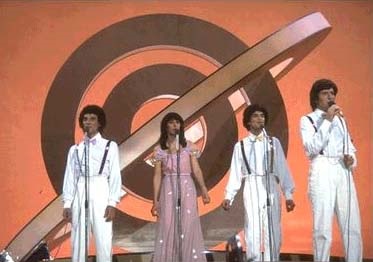
March 31, 1979
An annual song contest held between member countries of the European Broadcasting Union (EBU), the 1979 Eurovision Song Contest was held in Jerusalem. This marked the first time the competition was not held in geographic Europe since it began in 1956. Jerusalem was chosen as the host city as a result of the Israeli song, “A-Ba-ni-bi,” performed by Izhar Cohen and ‘Alphabeta,’ winning the 1978 contest in Paris.
While Israel joined the EBU in 1957, television was not introduced into the country until 1966 and commercial broadcasts didn’t start until 1968. When Israeli television executives first learned of the annual song contest in early 1972, they were reluctant to participate because the fledgling broadcasting authority did not have sufficient financial resources, returning the invitation, “out of the question – not enough budget.” Despite the lack of funds, a push was made for Israel to participate in the 1973 contest in order to capitalize on the opportunity to showcase the country’s culture and music artists to the European marketplace.
The 1978 success meant that Israel would be the host country for the 1979 contest. As a result, a massive financial investment was needed in order to upgrade Israeli television’s infrastructure, which in 1979 was still not able to broadcast fully in color. The 1979 Eurovision was a major popular culture event for the country and allowed Israel to showcase its culture to the rest of Europe. The event drew huge amounts of publicity and television viewers. For the second consecutive year, the Israeli entry won the contest with the song, Hallelujah, performed by Gali Atari and ‘Milk and Honey’ (shown in the photo), taking the top honors. Turkey, despite being the only Muslim country which had diplomatic relations with Israel at the time (the peace treaty between Israel and Egypt had been signed just five days before the event), withdrew its entry from the 1979 contest under pressure from Arab countries and as a protest over non-discussion and non-resolution of the Palestinian issue.
“Hallelujah” would go on to be a huge hit on the European charts.
Despite winning Eurovision in 1979, the Israel Broadcasting Authority declined hosting the 1980 event in order to devote all of its limited resources to switching Israeli television to color, which finally happened in 1981.
To see a video of the performance click here: http://www.youtube.com/watch?v=uDFNZwmkMxs
